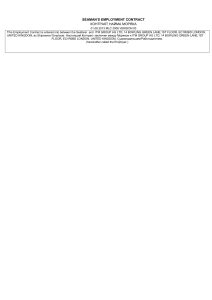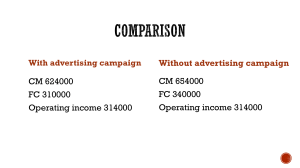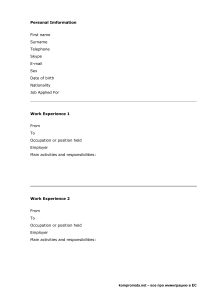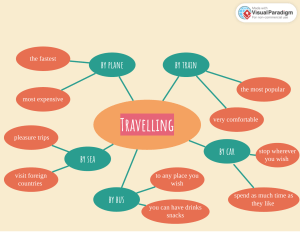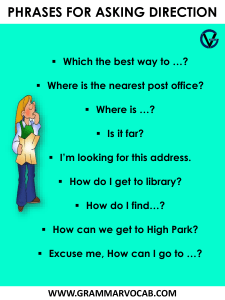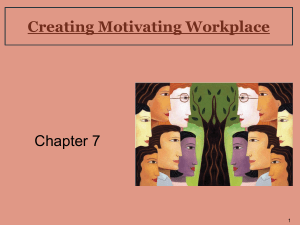
Unit 6
WRITING CV AND LETTER OF APPLICATION (Covering letter)
If you want to apply for a job you should present the information about yourself
correctly. You can do this with the help of CV.
Curriculum Vitaes
1. Discuss these questions:
1. What makes a good CV?
2. How long should it be?
3. What should it contain?
2. Read what a human resources manager says about CVs and
compare your ideas in ex. 1.
There's lots of advice on CVs and a lot of it differs so it's hard to
say exactly what the perfect CV is. I'd say a good CV should cover no
more than two sides of A4 paper and be divided into clear headings.
The first section should include personal details: name, address,
telephone number, email and things. Some employers like to see a
photo, too. You can always phone the company and find out.
Next comes education and qualifications starting with the most
recent things. The third section deals with work experience – again
starting with the most recent job. I think it's important here to be brief
so use bullet points and you don't need to use complete sentences as
long as it's very clear what you've done.
Following this is the section on professional skills. Show the
employer your abilities, including your ability to use IT and foreign
languages.
Finally, detail your interests. An employer likes to know what kind of
person you are and things like team sports, for example, show this.
Perhaps the most important thing is to show how you meet the
criteria in the job advertisement. Make it easy for the employer to ask
you to an interview.
Presentation is also important. Good quality paper and a clear
typeface make a difference. And once you've written your CV check
your grammar and spelling carefully.
3. Are these statements true or false?
1. A CV should be no longer than two pages.
2. You should always include a photograph.
3. You put the most recent experience first.
4. You should write in full sentences.
5. An employer is not interested in your hobbies and interests.
6. You should adapt your CV to the job description.
7. You should use good quality stationary.
8. You should make sure there are no grammar and spelling mistakes.
4. Draft your own CV using the sample form below. The words in
italics will give you some ideas how to present each section in a CV
Curriculum Vitae
NAME
ADDRESS
TELEPHONE
DATE OF BIRTH
NATIONALITY
SEX
EDUCATION
WORK
EXPERIENCE
June – August 1999
ACTIVITIES &
INTERESTS
…… - …….
…….. - ……..
Merrill Lynch: Private Banking Intern
Skills gained:
• working in a team
• report writing
• working to deadlines
• supervision of others
• liaison with clients
Cellist in school and college orchestra
Skills gained:
• performing in public
• social skills
Publicity officer, College Geographical
Society
Skills gained:
• managing a budget
• working to tight deadlines
Summer 1998
ADDITIONAL
SKILLS
Travel round Eastern Europe
Skills gained:
• planning and organizing
• independence
• clean driving license
• conversational French
• computer literate, Microsoft Office,
Excel and Word
REFERENCES
Prof. N Smart
Kings Charles College
London WCIZ 9ZZ
(Tutor)
Mr. T Davis
Merrill Lynch
London EC3T 2NB
(Employer)
Together with your CV you should write a covering letter. Here you are given
some instructions on how to do this.
Read the instructions and answer the following questions:
What is the covering letter for?
What parts does it contain?
What recommendations are given to you?
Writing a covering letter
Your covering letter could make the difference between getting a foot in the
door or having it slammed in your face.
Covering letters are not just sent as a courtesy, but are an introduction to
your potential employer. They are designed to complement your CV and provide
extra information about you. The covering letter is the first impression a potential
employer will have of you and without a good impact, they may not progress far
with your CV.
Introducing yourself - making an impact
A covering letter should be concise and ideally no more than three
paragraphs long. It needs to introduce you to the potential employer, say what you
want to do for the employer, and show how and why you are suited for that
particular work. Its main aim is to get your CV read.
The style of the covering letter should be reasonably formal and businesslike
and match the CV or application form you are sending. It should be typed
using a clear font and on good quality, plain white or cream paper, preferably the
same as the CV. If you are emailing it, make it look business-like.
Always write to a named individual, whether you are applying for a job or
writing a speculative letter. If you don't know who to address the letter to, use your
initiative and contact the company to find out the name of the relevant person.
Make sure you check the spelling of their name, no one likes to have their name
spelled incorrectly.
The opening paragraph should let the reader know why you are writing to
them. If you are writing to apply for a position with their company, make clear
which job you are applying for and where you saw the advertisement, give the title
and date of the publication that the vacancy was advertised in. For speculative
letters outline what kind of work you are looking for.
You need to show an interest in the position you are applying for and that
you have some knowledge of the employer. Find out about the company by
looking for other advertisements it may have, search the internet for its website,
look through the company's literature and scan business journals and newspapers
for other general information. Refer to any recent news about the company, this
will show you understand what the company is about.
Explain why you want to work there and emphasize what you can do for
the company. Avoid using phrases like 'I think I could gain valuable experience
with your company' or 'this is an area of my skill I have always wanted to develop'.
The employer will hire you because of what you can do for the company, not
because of what you think you can get from working there. Be keen, but genuine
and avoid using cliché phrases.
Don't state the obvious, e.g. 'I am writing to apply for the position, as you
will see from my CV' etc. Rather reword the opening of each paragraph to get
straight to the point, e.g. I am confident that my legal experience would make me a
suitable candidate for this position and have attached my CV for further reference.
Why should you get the job?
Paragraph two needs to tell the employer, in more detail, why you are suited
to the job and what skills you have got to offer. Why would the employer benefit
from taking you on? This is the most important section of the covering letter and
will probably make an employer decide whether to look at your CV or not. You
need to flag up two or three of your key selling points and give some concrete
information on the skills and experience you have.
Make sure you choose points that relate to the job you are applying for so
you can match your skills to their needs. The covering letter also gives you a
chance to show off skills that you might not be able to get across in the CV, such
as maturity, teamwork or interpersonal skills. Make sure everything you say about
your skills and experience in your covering letter is backed up by evidence in your
CV.
Positive endings
Don't let your letter fizzle out at the end with just a bland 'yours sincerely'.
Finish the letter with a strong, proactive phrase which sets the scene for the next
stage - being called in for an interview, e.g. 'I am available for interview at your
convenience and look forward to meeting you'. If you have addressed the letter to a
named person (and you should have done), you should end the letter with Yours
sincerely, if you wrote Dear Sir or Madam, it should end with Yours faithfully.
Point out several useful phrases that you can use in your covering letter.
- Look at the example of a covering letter.
- Does it correspond to the instructions given above?
- What should you add to the letter to make it better?
You are looking for a job. Find in the Internet or in the newspaper an
advertisement of a job you would like to have. Write your covering letter to apply
for a job.
Useful phrases:
I wonder if you would be so {kind|good} as to...
Will you be so kind as to...
Will you kindly...
I {shall|should} be {happy|glad|pleased} if you...
We are so {happy|glad|pleased} to...
We {will|would} be most {happy|glad|pleased} to...
I cannot tell you how {happy|glad|pleased} I am to...
I have much pleasure in... It gives me great pleasure to...
It {is|was|would be} a great pleasure (to me) to...
It is a great honour and pleasure to...
I enclose {herewith/herein}...
You will find {enclosed/with this letter}...
Please find enclosed...
Attached to this letter you will find...
I am very glad of the opportunity to give my {attention|consideration} to...
I am very grateful to you for giving so much attention to...
I am really happy that I can offer you my {attention|consideration} to...
I hope to hear from you soon and remain with kindest personal regards.
I hope to receive your favourable reply.
We look forward to hearing from you.
I am looking forward to hearing you soon.
We look forward to the opportunity {of + [gerund]|that}...
I look forward to the possibility {of + [gerund]|that}...
We look forward to welcoming you in this country.
I look forward to the pleasure of hearing you.
Sample Cover Letter
Charles Piper
41, Sefton Road
Manchester
15th April, 2013
Dear Sir,
I am writing to your advertisement in the Manchester Evening
Times on Wednesday 12 April. I would like to apply for the position
of Assistant Purser with Royal Mediterranean International.
I am an outgoing and motivated person and I also have strong
communication and organizational skills. I have not worked on board
a cruise ship before but I have experience as a hotel receptionist and I
have the GNVQ Diploma in Leisure and Tourism.
Please find enclosed a copy of my CV. I am available for interview at
any time.
Yours faithfully,
Charles Piper
Charles Piper
